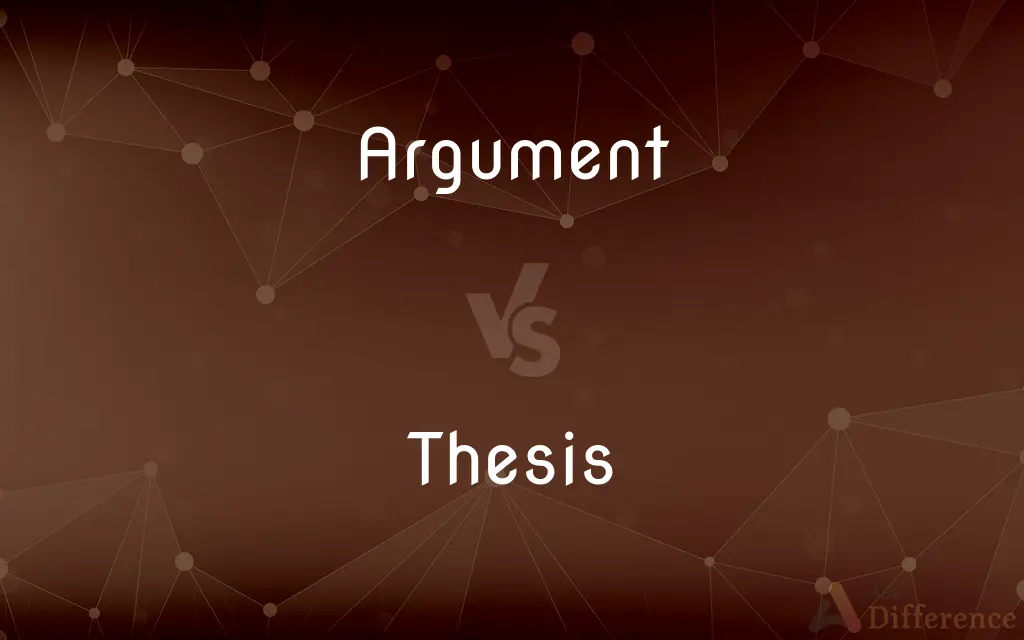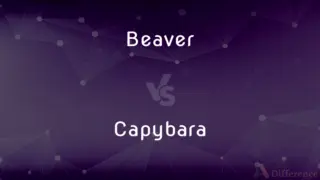Argument vs. Thesis — What's the Difference?

Difference Between Argument and Thesis
ADVERTISEMENT
Compare with Definitions
Argument
In logic and philosophy, an argument is a series of statements (in a natural language), called the premises or premisses (both spellings are acceptable), intended to determine the degree of truth of another statement, the conclusion. The logical form of an argument in a natural language can be represented in a symbolic formal language, and independently of natural language formally defined "arguments" can be made in math and computer science.
Thesis
A thesis, or dissertation (abbreviated diss.), is a document submitted in support of candidature for an academic degree or professional qualification presenting the author's research and findings. In some contexts, the word "thesis" or a cognate is used for part of a bachelor's or master's course, while "dissertation" is normally applied to a doctorate.
Argument
An exchange of diverging or opposite views, typically a heated or angry one
There was some argument about the decision
I've had an argument with my father
Heated arguments over public spending
Thesis
A proposition that is maintained by argument.
Argument
A reason or set of reasons given in support of an idea, action or theory
He rejected the argument that keeping the facility would be costly
There is a strong argument for submitting a formal appeal
ADVERTISEMENT
Thesis
A dissertation advancing an original point of view as a result of research, especially as a requirement for an academic degree.
Argument
An independent variable associated with a function or proposition and determining its value. For example, in the expression y = F(x₁, x₂), the arguments of the function F are x₁ and x₂, and the value is y.
Thesis
A hypothetical proposition, especially one put forth without proof.
Argument
Any of the noun phrases in a clause that are related directly to the verb, typically the subject, direct object, and indirect object.
Thesis
The first stage of the Hegelian dialectic process.
Argument
A summary of the subject matter of a book.
Thesis
The long or accented part of a metrical foot, especially in quantitative verse.
Argument
A discussion in which the parties involved express disagreement with one another; a debate
Philosophical arguments over the nature of existence.
Thesis
The unaccented or short part of a metrical foot, especially in accentual verse.
Argument
An angry discussion involving disagreement among the participants; a quarrel
The roommates had an argument about whose turn it was to wash the dishes.
Thesis
(Music) The accented section of a measure.
Argument
(Archaic) A reason or matter for dispute or contention
"sheath'd their swords for lack of argument" (Shakespeare).
Thesis
Senses relating to logic, rhetoric, etc.
Argument
A course of reasoning aimed at demonstrating truth or falsehood
Presented a strong argument for the arts in education.
Thesis
(rhetoric) A proposition or statement supported by arguments.
Argument
A fact or statement put forth as proof or evidence; a reason
The current low mortgage rates are an argument for buying a house now.
Thesis
(by extension) A lengthy essay written to establish the validity of a thesis (sense 1.1), especially one submitted in order to complete the requirements for a non-doctoral degree in the US and a doctoral degree in the UK; a dissertation.
Argument
A set of statements in which one follows logically as a conclusion from the others.
Thesis
A conjecture, especially one too vague to be formally stated or verified but useful as a working convention.
Argument
A summary or short statement of the plot or subject of a literary work.
Thesis
(logic) An affirmation, or distinction from a supposition or hypothesis.
Argument
A topic; a subject
"You and love are still my argument" (Shakespeare).
Thesis
(philosophy) In the dialectical method of Georg Wilhelm Friedrich Hegel: the initial stage of reasoning where a formal statement of a point is developed; this is followed by antithesis and synthesis.
Argument
(Logic) The minor premise in a syllogism.
Thesis
Senses relating to music and prosody.
Argument
The independent variable of a function.
Thesis
The action of lowering the hand or bringing down the foot when indicating a rhythm; hence, an accented part of a measure of music or verse indicated by this action; an ictus, a stress.
Argument
The angle of a complex number measured from the positive horizontal axis.
Thesis
A depression of the voice when pronouncing a syllables of a word; hence, the unstressed part of the metrical foot of a verse upon which such a depression falls, or an unaccented musical note.
Argument
(Computers) A value used to evaluate a procedure or subroutine.
Thesis
A position or proposition which a person advances and offers to maintain, or which is actually maintained by argument.
Argument
(Linguistics) A word, phrase, or clause in a semantic relation with a word or phrase and that helps complete the meaning of that word or phrase, such as a noun phrase that is the object of a verb. The clause that we go is an argument of the verb suggest in the sentence I suggest that we go.
Thesis
Hence, an essay or dissertation written upon specific or definite theme; especially, an essay presented by a candidate for a diploma or degree.
I told them of the grave, becoming, and sublime deportment they should assume upon this mystical occasion, and read them two homilies and a thesis of my own composing, to prepare them.
Argument
A fact or statement used to support a proposition; a reason.
Thesis
An affirmation, or distinction from a supposition or hypothesis.
Argument
A series of propositions organized so that the final proposition is a conclusion which is intended to follow logically from the preceding propositions, which function as premises.
Thesis
The accented part of the measure, expressed by the downward beat; - the opposite of arsis.
Argument
(countable) A process of reasoning; argumentation.
Thesis
The depression of the voice in pronouncing the syllables of a word.
Argument
(countable) An abstract or summary of the content of a literary work such as a book, a poem or a major section such as a chapter, included in the work before the content itself; (figuratively) the contents themselves.
Thesis
An unproved statement put forward as a premise in an argument
Argument
(countable) A verbal dispute; a quarrel.
The neighbours got into an argument about the branches of the trees that extended over the fence.
Thesis
A treatise advancing a new point of view resulting from research; usually a requirement for an advanced academic degree
Argument
Any dispute, altercation, or collision.
Steve got in a physical argument with his neighbor and came away with a black eye.
While biking home, he got in an argument with the pavement.
Argument
Any of the phrases that bears a syntactic connection to the verb of a clause.
Argument
The independent variable of a function.
Argument
The phase of a complex number.
Argument
A quantity on which the calculation of another quantity depends.
The altitude is the argument of the refraction.
Argument
A value, or a reference to a value, passed to a function.
Parameters are like labelled fillable blanks used to define a function whereas arguments are passed to a function when calling it, filling in those blanks.
Argument
A parameter at a function call; an actual parameter, as opposed to a formal parameter.
Argument
A matter in question; a business in hand.
Argument
The subject matter of an artistic representation, discourse, or writing; a theme or topic.
Argument
Evidence, proof; (countable) an item of such evidence or proof.
Argument
To put forward as an argument; to argue.
Argument
To adduce evidence, to provide proof.
Argument
Proof; evidence.
There is.. no more palpable and convincing argument of the existence of a Deity.
Why, then, is it made a badge of wit and an argument of parts for a man to commence atheist, and to cast off all belief of providence, all awe and reverence for religion?
Argument
A reason or reasons offered in proof, to induce belief, or convince the mind; reasoning expressed in words; as, an argument about, concerning, or regarding a proposition, for or in favor of it, or against it.
Argument
A process of reasoning, or a controversy made up of rational proofs; argumentation; discussion; disputation.
The argument is about things, but names.
Argument
The subject matter of a discourse, writing, or artistic representation; theme or topic; also, an abstract or summary, as of the contents of a book, chapter, poem.
You and love are still my argument.
The abstract or argument of the piece.
[Shields] with boastful argument portrayed.
Argument
Matter for question; business in hand.
Sheathed their swords for lack of argument.
Argument
The quantity on which another quantity in a table depends; as, the altitude is the argument of the refraction.
Argument
The independent variable upon whose value that of a function depends.
Argument
To make an argument; to argue.
Argument
A fact or assertion offered as evidence that something is true;
It was a strong argument that his hypothesis was true
Argument
A contentious speech act; a dispute where there is strong disagreement;
They were involved in a violent argument
Argument
A discussion in which reasons are advanced for and against some proposition or proposal;
The argument over foreign aid goes on and on
Argument
A summary of the subject or plot of a literary work or play or movie;
The editor added the argument to the poem
Argument
A variable in a logical or mathematical expression whose value determines the dependent variable; if f(x)=y, x is the independent variable
Share Your Discovery

Previous Comparison
Beaver vs. Capybara
Next Comparison
Avid vs. Enthusiast














































